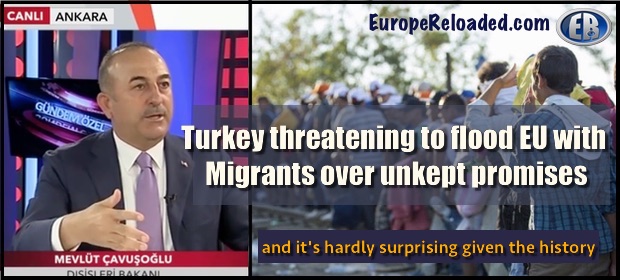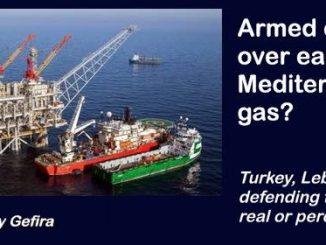
ER Editor: On this topic we also recommend this short piece by Middle East Monitor titled Turkey to cancel EU migrant deal over lack of visa-free travel.
********
Turkey Threatens to Reignite European Migrant Crisis
- “We are facing the biggest wave of migration in history. If we open the floodgates, no European government will be able to survive for more than six months. We advise them not to try our patience.” — Turkish Interior Minister Süleyman Soylu.
- “Turkey is fully committed to the objective of EU membership… The finalization of the Visa Liberalization Dialogue process which will allow our citizens to travel to the Schengen area without a visa, is our first priority.” — Statement released by the Turkish Foreign Ministry, May 9, 2019.
- “This doesn’t mean that I have anything against the Turks…. But if we begin to explain it — that Turkey is in Europe — European school students will have to be told that the European border lies in Syria. Where’s common sense? … Can Turkey be regarded a European country culturally, historically, and economically speaking? If we say that, we want the European Union’s death.” — Former French President Nicolas Sarkozy.
- If the EU approves the visa waiver, tens of millions of Turks will gain immediate and unimpeded access to Europe’s passport-free zone. Critics of visa liberalization fear that millions of Turkish nationals may end up migrating to Europe. The Austrian newsmagazine, Wochenblick, reported that 11 million Turks are living in poverty and “many of them are dreaming of moving to central Europe.”
 Turkey has threatened to re-open the floodgates of mass migration to Europe unless Turkish nationals are granted visa-free travel to the European Union. Turkey currently hosts an estimated 3.5 million migrants and refugees — mainly Syrians, Iraqis and Afghans. Many of these people presumably would migrate to Europe if given the opportunity to do so. Pictured: The Adiyaman refugee camp in Turkey. (Image source: UNHCR) Turkey has threatened to re-open the floodgates of mass migration to Europe unless Turkish nationals are granted visa-free travel to the European Union. Turkey currently hosts an estimated 3.5 million migrants and refugees — mainly Syrians, Iraqis and Afghans. Many of these people presumably would migrate to Europe if given the opportunity to do so. Pictured: The Adiyaman refugee camp in Turkey. (Image source: UNHCR) |
Turkey has threatened to re-open the floodgates of mass migration to Europe unless Turkish nationals are granted visa-free travel to the European Union. The EU agreed to visa liberalization in a March 2016 EU-Turkey migrant deal in which Ankara pledged to stem the flow of migrants to Europe.
European officials insist that while Turkey has reduced the flow of migrants, it has not yet met all of the requirements for visa liberalization. Moreover, EU foreign ministers on July 15 decided to halt high-level talks with Ankara as part of sanctions over Turkish oil and gas drilling off the coast of Cyprus.
In an interview with Turkish television channel TGRT Haber on July 22, Turkish Foreign Minister Mevlut Çavuşoğlu said that Turkey was backing out of the migrant deal because the EU had failed to honor its pledge to grant Turkish passport holders visa-free access to 26 European countries. “We have suspended the readmission agreement,” he said. “We will not wait at the EU’s door.”
A day earlier, Turkish Interior Minister Süleyman Soylu accused European countries of leaving Turkey alone to deal with the migration issue. In comments published by the state news agency Anadolu Agency, he warned:
“We are facing the biggest wave of migration in history. If we open the floodgates, no European government will be able to survive for more than six months. We advise them not to try our patience.”
The migration deal, which entered into force on June 1, 2016, was hastily negotiated by European leaders desperate to gain control over a crisis in which more than one million migrants poured into Europe in 2015.
Under the agreement, the EU pledged to pay Turkey €6 billion ($6.7 billion), grant visa-free travel to Europe for Turkey’s 82 million citizens, and restart accession talks for Turkey to join the EU. In exchange, Turkey agreed to stop the flow of migrants to Europe, as well as to take back all migrants and refugees who illegally reach Greece from Turkey.
Turkey currently hosts an estimated 3.5 million migrants and refugees — mainly Syrians, Iraqis and Afghans. Many of these people presumably would migrate to Europe if given the opportunity to do so.
Responding to Çavuşoğlu’s remarks, EU spokesperson Natasha Bertaud insisted that Turkey’s continued enforcement of the EU-Turkey deal remains a condition for visa liberalization.
Turkish officials have repeatedly accused the EU of failing to keep its end of the bargain, especially with respect to visa liberalization and accession to the EU.
Under the agreement, European officials promised to fast-track visa-free access for Turkish nationals to the Schengen (open-bordered) passport-free zone by June 30, 2016 and to restart Turkey’s stalled EU membership talks by the end of July 2016.
To qualify for the visa waiver, Turkey had until April 30, 2016 to meet 72 conditions. These include: bringing the security features of Turkish passports up to EU standards; sharing information on forged and fraudulent documents used to travel to the EU, and granting work permits to non-Syrian migrants in Turkey.
European officials say that although Turkey has fulfilled most of their conditions, it has failed to comply with the most important one: relaxing its stringent anti-terrorism laws, which are being used to silence critics of Turkish President Recep Tayyip Erdoğan.
Since Turkey’s failed coup on July 15, 2016, more than 95,000 Turkish citizens have been arrested and at least 160,000 civil servants, teachers, journalists, police officers and soldiers have been fired or suspended from various state-run institutions.
Responding to the purge, the European Parliament on March 13, 2019 called for EU accession negotiations with Turkey to be suspended. “While the EU accession process was at its start a strong motivation for reforms in Turkey, there has been a stark regression in the areas of the rule of law and human rights during the last few years,” according to the adopted text.
Turkey was first promised EU membership in September 1963, when it signed an “Association Agreement” aimed at establishing a customs union to pave the way for eventual accession to the EU. Turkey formally applied for EU membership in April 1987, and membership talks began in October 2005.
Turkey’s EU accession talks stalled in December 2006 after the Turkish government refused to open Turkish ports and airports to trade from Cyprus. Since then, talks have continued on and off, but the process has been stalled due to political opposition from France and Germany, among others.
If Turkey were to join the EU, it would overtake Germany to become the EU’s largest member in terms of population. Consequently, the EU’s largest member state would be Muslim. Some European officials have warned that Turkish accession would cause Europe to “implode” and be “Islamized.”
 Former French President Nicolas Sarkozy has said that Turkey has no place in the EU. In a February 2016 interview with the French news channel iTélé, he expressed sentiments that presumably are shared by many Europeans:
Former French President Nicolas Sarkozy has said that Turkey has no place in the EU. In a February 2016 interview with the French news channel iTélé, he expressed sentiments that presumably are shared by many Europeans:
“Turkey has no place in Europe. I have always adhered to this position, it is based on common sense. This doesn’t mean that I have anything against the Turks. We need them, they are our allies in NATO. But if we begin to explain it — that Turkey is in Europe — European school students will have to be told that the European border lies in Syria. Where’s common sense?
“It’s not just that. What’s the idea behind Europe? Europe is a union of European countries. The question is very simple, even in a geographical sense, is Turkey a European country? Turkey has only one shore of the Bosporus in Europe. Can Turkey be regarded a European country culturally, historically, and economically speaking? If we say that, we want the European Union’s death.”
On May 9, 2019, Erdoğan said that Turkey was committed to joining the EU. A statement released by the Turkish Foreign Ministry noted:
“Turkey remains committed to its objective of EU membership and continues its efforts in this respect…. Our expectation from the EU is to treat Turkey on equal footing with other candidate countries and to remove political barriers on the way of negotiations which is supposed to be a technical process…
“Although our accession negotiations are politically blocked, Turkey decisively continues its efforts for alignment with the EU standards. In the meeting today, we have set out the current developments in Turkey and agreed on the steps to be taken in the forthcoming period.
“The finalization of the Visa Liberalization Dialogue process which will allow our citizens to travel to the Schengen area without a visa, is our first priority.”
Even if Turkey complies with all of the EU’s demands, it seems unlikely that Turkish nationals will be granted visa-free travel anytime soon. On July 15, EU foreign ministers formally linked progress on Turkish-EU relations to Cyprus. A measure adopted by the European Council on July 15 states:
“The Council deplores that, despite the European Union’s repeated calls to cease its illegal activities in the Eastern Mediterranean, Turkey continued its drilling operations west of Cyprus and launched a second drilling operation northeast of Cyprus within Cypriot territorial waters.
CONTINUE READING HERE
Soeren Kern is a Senior Fellow at the New York-based Gatestone Institute. Follow Soeren Kern on Twitter and Facebook

••••
The Liberty Beacon Project is now expanding at a near exponential rate, and for this we are grateful and excited! But we must also be practical. For 7 years we have not asked for any donations, and have built this project with our own funds as we grew. We are now experiencing ever increasing growing pains due to the large number of websites and projects we represent. So we have just installed donation buttons on our websites and ask that you consider this when you visit them. Nothing is too small. We thank you for all your support and your considerations … (TLB)
••••
Comment Policy: As a privately owned web site, we reserve the right to remove comments that contain spam, advertising, vulgarity, threats of violence, racism, or personal/abusive attacks on other users. This also applies to trolling, the use of more than one alias, or just intentional mischief. Enforcement of this policy is at the discretion of this websites administrators. Repeat offenders may be blocked or permanently banned without prior warning.
••••
Disclaimer: TLB websites contain copyrighted material the use of which has not always been specifically authorized by the copyright owner. We are making such material available to our readers under the provisions of “fair use” in an effort to advance a better understanding of political, health, economic and social issues. The material on this site is distributed without profit to those who have expressed a prior interest in receiving it for research and educational purposes. If you wish to use copyrighted material for purposes other than “fair use” you must request permission from the copyright owner.
••••
Disclaimer: The information and opinions shared are for informational purposes only including, but not limited to, text, graphics, images and other material are not intended as medical advice or instruction. Nothing mentioned is intended to be a substitute for professional medical advice, diagnosis or treatment.




